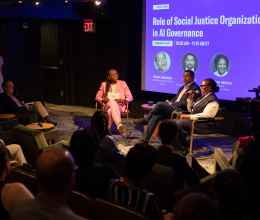Yesterday, we closed our office in observance of Martin Luther King Jr. Day and observed the legacy of this great civil rights leader. It was an opportunity for us to reflect on the immense gains our country made because of the Civil Rights movement and be inspired by the words, courage and actions of leaders like Dr. King. However it was also an opportunity for us to think about the goals of the Civil Rights movement and, when it comes to racial justice and equality, where America is today.
I think it is pretty safe to say that there is an immense amount of work yet to be done.
While the old Jim Crow laws have formerly been dismantled, structural inequalities persist and new systems of oppression have emerged. Today, new challenges - such as that of mass incarceration – have created new barriers to racial justice and equality in America.
At this point, most people are aware that the United States is the number one incarcerator in the world. We imprison more people than any other country in the world, both when calculated based on population rate and in raw numbers. Even in Maine – the state with the lowest incarceration rate in the country – we incarcerate people at a higher rate than the vast majority of the world’s countries, even in countries with highly repressive authoritarian governments.
But even more disturbing than just the shear number of people we incarcerate is who we incarcerate. While black people make up just 13 percent of the United States’ population, they account for almost 50 percent of our prisoners. According to the Sentencing Project, one in three black men can expect to be incarcerated at some point in his lifetime. This compares to one in 17 white men.
While black people don’t necessarily commit crimes at higher rates, they are arrested at much higher rates that white people. For example, while a survey on drug abuse done by the Substance Abuse and Mental Health Services Administration of the U.S. Department of Health and Human Services found that people of all races use drugs at virtually identical rates, over two-thirds of people in prison for drug offenses are people of color. Even in Maine, black people are almost four times more likely to be arrested for a drug offense than white people.
Once inside the system, the vast majority of people are unable to extricate themselves from the criminal justice maze. According to data from the Bureau of Justice Statistics, almost 70 percent of former prisoners were re-arrested within three years. This is due in part to our exceptionally punitive system of collateral consequences – a permanent set of sanctions and restrictions that people with criminal convictions face. Some collateral consequences include ineligibility for public benefits such as housing, food stamps and federal student aid; significant barriers to finding employment, and, in some states, restrictions or even lifetime bans on voting.
Collateral consequences set up a de facto system of legalized discrimination, ensuring that, even after serving their court-ordered sentence, those with criminal convictions maintain a second-class status. Given the vast racial disparities present in our justice system, collateral consequences function and operate much the same way as the old Jim Crow laws of the segregated south. According to Michelle Alexander in her book The New Jim Crow, while it is no longer acceptable to use overtly race-based language to justify racial exclusion and discrimination, rather than dismantle the racialized caste system of the Jim Crow era, mass incarceration has redesigned it, albeit masked behind the pretense of a “colorblind” criminal justice system. Consider this:
- Today, nearly 1 million of the 2.2 million people incarcerated in the United States is black. In some urban communities, 50 to 60 percent of all young men of color are in jail or prison or on probation or parole. There are more black men under correctional control today, than were enslaved in 1850.
- In Alabama, a state that permanently disenfranchises people with a criminal conviction, 34 percent of the male black population has permanently lost the right to vote. Projections show that over the next 10 years, the level of voter disenfranchisement will be as high as prior to the passage of the Voting Rights Act of 1965.
- In 1987 the Equal Employment Opportunity Commission declared that blanket bans on hiring people with a criminal records, was a violation of the Civil Rights Act as it reinforced already existing racial disparities.
This morning I read a letter sent by Dr. King from the Birmingham City Jail to his fellow clergymen, in which he famously wrote: “[i]njustice anywhere is a threat to justice everywhere. We are caught in an inescapable network of mutuality, tied in a single garment of destiny.” There is no question that there is injustice in our criminal justice system: we have built a system where too often guilt is predicated more on race than on the actions of individuals and where severity of a sentence is determined more by ones access to resources than the gravity of a crime. We have created a system that too often is not rehabilitative, as too often people come out in worse condition than when they entered. We have created a system that too often disenfranchises and marginalizes already disenfranchised and marginalized populations.
It is vital that we recognize and take action against the injustice being done to our fellow citizens. As we celebrate the legacy of Dr. King we must also recommit ourselves to confronting racism and dismantling systems that perpetuate bias and bring our nation one step closer to realizing Dr. King’s dream of racial justice and equality for all.








